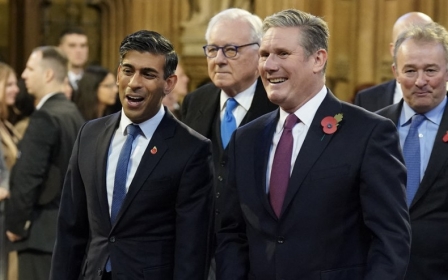War on Gaza: UK minister pays damages after accusing academics of supporting Hamas

The UK’s secretary of state for science, innovation and technology, Michelle Donelan, has been forced to apologise and pay damages after she accused academics of “sharing extremist views” and supporting Hamas.
Donelan published a letter to UK Research and Innovation (UKRI) urging them to cut links with academics Kate Sang and Kamna Patel, citing her “disgust and outrage” at their appointment to an expert advisory group on equality, diversity and inclusion.
Donelan’s letter referenced Sang reposting an article from The Guardian in October, which was headlined “Suella Braverman urges police to crack down on Hamas support in UK”.
Sang reposted the article with the comment: “This is disturbing.”
The organisation, which is responsible for channelling £3bn in higher education research funding, suspended both academics while carrying out investigations into allegations.
Stay informed with MEE's newsletters
Sign up to get the latest alerts, insights and analysis, starting with Turkey Unpacked
On Tuesday, the UKRI board announced that the investigation concluded and had found “no evidence in the public domain of support for a proscribed terrorist organisation or the sharing of extremist material and no grounds to remove any individual members of the Research England expert advisory group”.
Sang issued a statement saying: “I am delighted that this matter has now concluded, but very disturbed by the way in which Michelle Donelan and UKRI behaved. Had they asked me at the start, I would have explained the true position.
“Instead, Michelle Donelan made a cheap political point at my expense and caused serious damage to my reputation. I propose to donate part of the damages she has paid to a charity,” she added.
'Distressting events'
Dr Patel, who works for the University College London, said that there was “never any need for UKRI to investigate as it should have been obvious from the start that we had not breached the Nolan principles or expressed extremist views.”
Patel added that the allegations were a “distressing series of events” and that the UKRI was steered by claims that had no substance.
Donelan said she was grateful for Sang’s clarification and that she has withdrawn her original concerns regarding the tweet.
'I fully accept that [Professor Sang] is not an extremist, a supporter of Hamas or any other proscribed organisation'
- Michelle Donelan, UK science minister
“I have never thought or claimed that Professor Sang, or any member of the board [of Research England’s expert advisory group], committed a criminal offence,” she said in a statement.
“I fully accept that she is not an extremist, a supporter of Hamas or any other proscribed organisation, and I note that an independent investigation has concluded that there was no evidence that she is. I have deleted my original post to my X accounts,” she added.
Despite her apology, Donelan’s actions were met with some criticism.
Peter Kyle, the shadow science secretary, responded to the case, saying: “The secretary must prove she still has the confidence of the research community after using her department to make false allegations against academics.”
He added that accusing a researcher of sharing extremist material and sympathising with a proscribed organisation was a “new low in government standards”.
Donelan was also denounced for making what has been called baseless accusations.
Tasnim Allen, who represented Sang in her libel complaint said it was “extraordinary that a minister should be guided by a lobby group into making serious false allegations about private citizens without doing the first piece of due diligence.”
Middle East Eye delivers independent and unrivalled coverage and analysis of the Middle East, North Africa and beyond. To learn more about republishing this content and the associated fees, please fill out this form. More about MEE can be found here.




